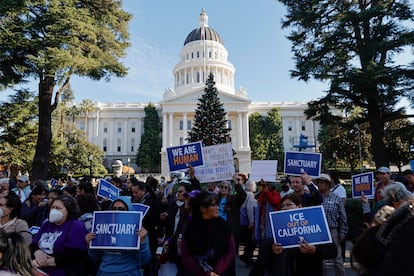Pro-migrant organizations mobilize against Trump’s mass deportation plans
TPS beneficiaries go on hunger strike to ask President Biden to renew their temporary protection before the Republican tycoon takes office


December 18 is International Migrants Day, and this year the imminent return of Donald Trump to the White House with plans for mass deportations makes the date more significant than ever. Dozens of pro-immigrant organizations have called for demonstrations to draw attention to the plight of the more than 11 million undocumented immigrants residing in the country, and whom the president-elect said he intends to expel. This week’s agenda is filled with marches, workshops, demonstrations, press conferences, and calls to lawmakers and to President Joe Biden to act and protect migrants before he hands over power to the tycoon on January 20.
Desperately afraid of being expelled, at least 10 people from El Salvador and Honduras began a hunger strike in Washington on Monday to ask Biden to renew their TPS (Temporary Protected Status) before Trump occupies the Oval Office again.
Evelin Hernández arrived in the nation’s capital from Los Angeles on Saturday to participate in the hunger strike. The 50-year-old Salvadoran national has been living in the United States for 33 years and she is an activist for migrant rights. Married to a Mexican-American citizen and with three children born in the United States, she decided to defend her rights and those of her compatriots with an extreme measure: “I am here because there are many TPS beneficiaries who, for health reasons, cannot participate in this effort. I feel capable of doing it and sending the message to President Biden that he has the power to extend the TPS program for 18 more months, so that he does not leave the Central American community in limbo,” she explained in a telephone conversation with EL PAÍS.
The inclement weather prevented them from demonstrating in front of the White House as planned. Security agents did not let them set up tents to take shelter from the cold and rain, so they temporarily moved to the United Methodist Building on Maryland Avenue, the only non-governmental building on Capitol Hill. The initial participants in the hunger strike came from several states: Massachusetts, Nevada, Texas, and California, but more migrants from other states are expected to arrive throughout the week to join the protest called by the National TPS Alliance.
The TPS program was created in 1990 to allow residency to people whose countries of origin are considered unsafe. Salvadorans, with 195,000 beneficiaries, are the largest group, followed by Hondurans (57,000) and Haitians (50,000). Most have been in the country for more than two decades and have formed families, often with U.S. citizens, and their children were born in the U.S., so their expulsion would mean a dramatic family separation. Trump has already announced that to avoid this, he will deport entire families, which raises many logistical and legal questions.
The permit for Salvadorans, which must be renewed every 18 months, expires in March and the extension must be approved two months in advance, so activists are urging Biden to do so before January 8. After that date, they will be left in limbo and with little hope that Trump will renew their permit. During his first presidency, Trump tried unsuccessfully to end the program, but his plan for mass deportations, which he intends to begin on the first day of his mandate, includes TPS on the list of those threatened with expulsion.
“Trump is not going to extend TPS for us, we know this from the threats he has made in all the media interviews he has given. That is why we want to ensure that the current president does so,” Hernández explains.
Calls for Biden to protect TPS migrants as well as those in DACA (the program that benefits foreigners who entered illegally as children) have been repeated since Trump won an overwhelming victory in the November 5 election. Last week, Latino Democratic senators joined together to urge the president to act quickly to ensure protection for migrants in both programs.
Trump “will try to make good on his promises of mass deportation, family separation, harming our communities and destroying our economy, which is why it is even more critical that President Biden takes action to defend and protect our communities,” said Murad Awawdeh, co-president of FIRM, the immigration reform movement that brings together 38 entities from 32 states.
On Wednesday, two marches called by CHIRLA, one in the morning and one in the afternoon, will end at an ICE detention center. On the same day, the Pennsylvania Immigrant and Citizen Coalition (PICC) has also called for a demonstration. Over the course of five days, there are at least 14 events planned in 13 states to protest. The Home is Here campaign, organized to defend DACA beneficiaries, the so-called Dreamers, will send a delegation of hundreds of migrants and allies from across the country to Congress on Tuesday to ask legislators to reject Trump’s anti-immigrant agenda.
Although the majority of migrants under threat are Latinos, they are not the only ones affected. Jung Woo Kim, co-director of the National Korean American Services and Education Consortium (NAKASEC), which is also participating in the mobilizations, points out: “As Congress works to approve a budget before December 20, it must act to protect immigrant families, including Asian-American communities, from the harmful deportation and detention policies promoted by the Trump Administration.”
On her first day of hunger strike, Evelin Hernández is brave in the face of whatever may happen: “They stole my fear when they tried to take away my TPS (during Trump’s first term). Now I am ready to fight and go as far as I have to go to defend my right.”
Sign up for our weekly newsletter to get more English-language news coverage from EL PAÍS USA Edition
Tu suscripción se está usando en otro dispositivo
¿Quieres añadir otro usuario a tu suscripción?
Si continúas leyendo en este dispositivo, no se podrá leer en el otro.
FlechaTu suscripción se está usando en otro dispositivo y solo puedes acceder a EL PAÍS desde un dispositivo a la vez.
Si quieres compartir tu cuenta, cambia tu suscripción a la modalidad Premium, así podrás añadir otro usuario. Cada uno accederá con su propia cuenta de email, lo que os permitirá personalizar vuestra experiencia en EL PAÍS.
¿Tienes una suscripción de empresa? Accede aquí para contratar más cuentas.
En el caso de no saber quién está usando tu cuenta, te recomendamos cambiar tu contraseña aquí.
Si decides continuar compartiendo tu cuenta, este mensaje se mostrará en tu dispositivo y en el de la otra persona que está usando tu cuenta de forma indefinida, afectando a tu experiencia de lectura. Puedes consultar aquí los términos y condiciones de la suscripción digital.








































